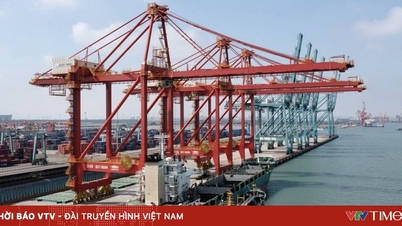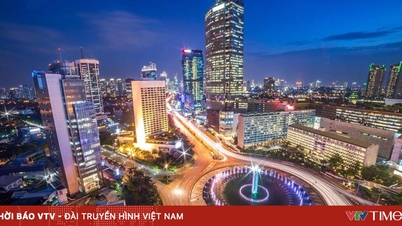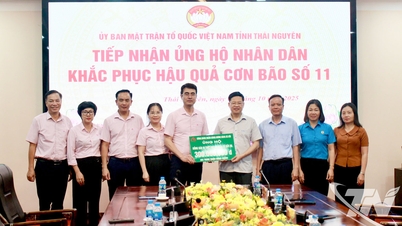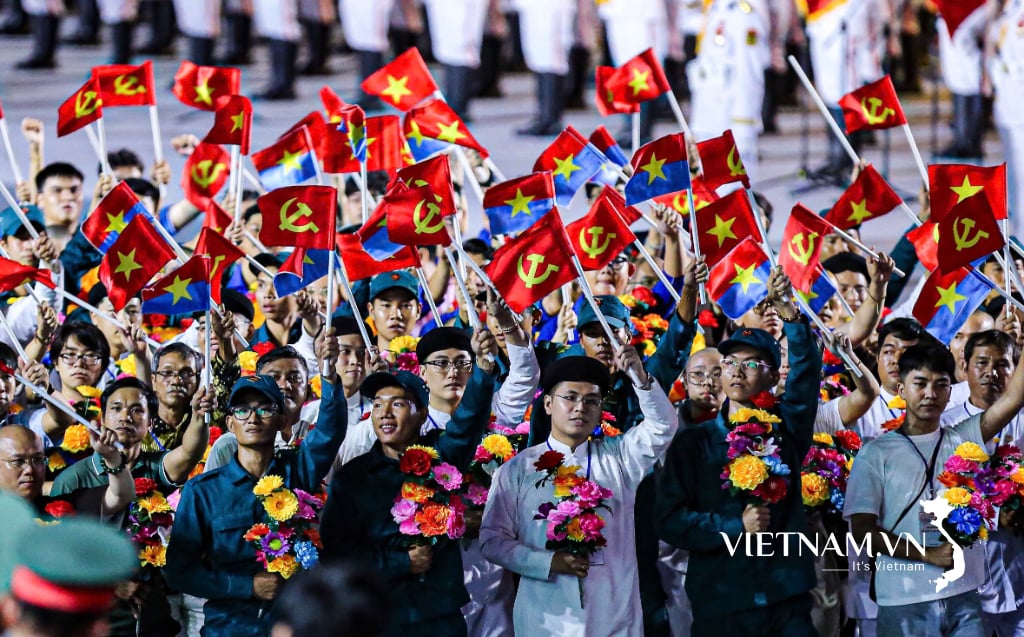According to the recently announced 38th Global Financial Centres Index (GFCI 38), Ho Chi Minh City continues to improve its position by rising 3 places, from 98th to 95th out of 120 ranked cities. This is a new step forward compared to the announcement in March and especially Ho Chi Minh City for the first time surpassed Bangkok - Thailand in the rankings, a signal that many experts have positively evaluated in the roadmap to build an international financial center in Vietnam.
Rise Strong
According to the report, Ho Chi Minh City scored 664 points, up 10 points compared to GFCI 37, while Bangkok fell to 102nd place with 657 points, down 6 places. In the leading group, the two cities New York - USA and London - UK still hold the number 1 and number 2 positions. Hong Kong (China) continues to maintain its position as the third largest financial center in the world; while Singapore, the representative of Southeast Asia, increased 13 points but still holds the 4th position.
The GFCI score is based on more than 140 criteria provided by international organizations such as the United Nations, the World Bank, and the World Economic Forum, reflecting comprehensiveness in the assessment.
Over the past year, Ho Chi Minh City has made an impressive leap, rising a total of 10 places, showing a shift in how the international market views the city’s potential. In addition, GFCI 38 also included Ho Chi Minh City in the group of “financial centers to watch”, meaning that the city has begun to attract greater attention from the global financial community.
The GFCI 38 report classifies criteria into five groups: business environment, human resources, infrastructure, financial development and reputation. For Ho Chi Minh City, the outstanding strengths are its role as an economic gateway to Southeast Asia, high growth rate and increasing demand for international capital. In particular, efforts to reform taxes and implement a sandbox (controlled testing mechanism) on digital finance are also recognized, contributing to creating a foundation for the city to go further.

Thu Thiem New Urban Area was chosen as the headquarters of the International Financial Center in Ho Chi Minh City.
Associate Professor Dr. Nguyen Huu Huan, a member of the Advisory Working Group for the construction and development of the Vietnam International Financial Center in Ho Chi Minh City, said that the city is in the group of centers that are expected to become more important in the next 2-3 years, with 12 times being mentioned along with major centers such as Dubai, Singapore, Riyadh or Abu Dhabi.
"Ho Chi Minh City is rising strongly on the world financial map, aiming to become an international financial center by 2030. From an idea conceived two decades ago, Vietnam's largest city has now taken bold steps to attract global capital flows and promote fintech innovation. Ho Chi Minh City's position on international rankings has also continuously improved, reflecting its determination and potential to reach new heights," Mr. Huan shared.
Not only domestic experts but also international observers highly appreciate Vietnam's opportunities. Ms. Nguyen Thuy Hanh, General Director and Head of Corporate and Investment Banking at Standard Chartered Bank Vietnam, believes that the establishment of an international financial center in Ho Chi Minh City and Da Nang will create a new playground for domestic and foreign financial institutions. "The international financial center will offer products close to the standards of global centers, expanding cooperation and development opportunities for both the domestic market and international investors," Ms. Hanh emphasized.
There are still bottlenecks
However, according to experts, if Ho Chi Minh City wants to achieve the goal of entering the top 50 financial centers in the world by 2035, it must make a leap forward, overcoming the "bottlenecks" pointed out by the GFCI 38 report - from legal transparency, digital infrastructure, financial technology human resources to international branding strategy... This is the key for the Ho Chi Minh City International Financial Center to become a destination for global capital flows, especially in the rapidly developing financial technology sector.
Associate Professor Dr. Nguyen Huu Huan proposed policies that could include exemption or reduction of corporate income tax for financial companies, exemption of personal income tax for experts and highly qualified personnel, and creating favorable visa conditions for international experts and their families.
A notable point is that the "one-stop" mechanism needs to be thoroughly applied to shorten the time for processing documents. "Applications for membership of the international financial center can be submitted online and granted temporary approval in just 1 day, no more than 7 days for official recognition. In particular, corporations on the Fortune 500 list (a ranking of the 500 largest companies in the US) will be automatically recognized without appraisal, in order to attract real financial "eagles" to nest" - Mr. Huan added.
Meanwhile, the Ministry of Finance proposed a regulation on a minimum capital of VND5,000 billion for securities companies to be eligible to establish in the international financial center. For foreign investors, this figure is expected to be equivalent to USD190 million. At the same time, the State Bank also announced a draft regulation on licensing the establishment and operation of banks in the Vietnam International Financial Center.
Accordingly, a 100% domestic commercial bank must have total assets of at least VND100,000 billion, while a 100% foreign bank needs at least USD10 billion. Foreign bank branches must also have assets of at least USD20 billion. These criteria aim to ensure scale, financial capacity and transparency, limiting the risk of small organizations participating in the system.
Speaking at the recent Vietnam Financial Advisory Summit, Deputy Minister of Finance Nguyen Thi Bich Ngoc said that ministries and branches are urgently completing eight guiding decrees to submit to the Government for promulgation, creating a legal framework for the international financial center.
She emphasized that the approach in developing these decrees is to comply with international standards, ensure regional competitiveness and lay the foundation for long-term development. "Without a superior mechanism, Vietnam will find it difficult to compete in attracting global financial institutions," said Ms. Ngoc.
In fact, along with tax incentives and testing mechanisms, a series of hard and soft infrastructures are being strongly deployed in Ho Chi Minh City and Da Nang - from transportation, logistics, telecommunications to digital infrastructure... creating an ecosystem to support the financial center.
A series of new steps
According to information from the Advisory Working Group for the construction and development of the Vietnam International Finance Center in Ho Chi Minh City, from 2026, the city will deploy a sandbox for new areas such as digital assets, peer-to-peer lending (P2P lending), carbon credit market and fintech. Also in the period of 2026-2027, the city plans to operate a 24/7 T+0 payment system, build an international standard data center and connect financial infrastructure with ASEAN and major markets.
The Ho Chi Minh City International Financial Center also implements synchronous steps such as training programs on digital finance, AI, green finance in collaboration with universities and international corporations. There is a special visa policy for working experts; signing cooperation agreements with international stock exchanges and international financial institutions such as Nasdaq, Deutsche Bank, Ant Group. In particular, in the period of 2026-2027, the International Financial Center will operate international stock exchanges, commodity exchanges and carbon exchanges... to attract international investment funds.
Source: https://nld.com.vn/buoc-tien-moi-cua-trung-tam-tai-chinh-quoc-te-tp-hcm-196250930221232725.htm


![[Photo] Unique Phu Gia horse hat weaving craft](https://vphoto.vietnam.vn/thumb/1200x675/vietnam/resource/IMAGE/2025/10/10/1760084018320_ndo_br_01-jpg.webp)

![[Photo] Opening of the World Cultural Festival in Hanoi](https://vphoto.vietnam.vn/thumb/1200x675/vietnam/resource/IMAGE/2025/10/10/1760113426728_ndo_br_lehoi-khaimac-jpg.webp)

![[Photo] Ho Chi Minh City is brilliant with flags and flowers on the eve of the 1st Party Congress, term 2025-2030](https://vphoto.vietnam.vn/thumb/1200x675/vietnam/resource/IMAGE/2025/10/10/1760102923219_ndo_br_thiet-ke-chua-co-ten-43-png.webp)



































































































Comment (0)